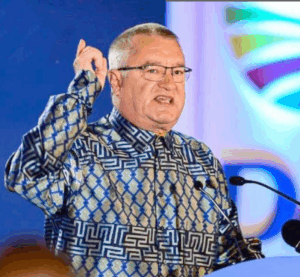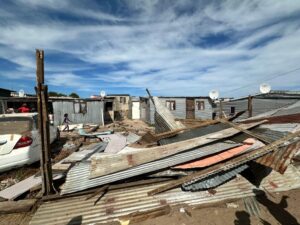(The following debate was delivered by DA KZN Spokesperson on Health, Dr Imran Keeka, MPL during a Budget Sitting in the KZN Legislature today)
Healthcare remains one of the most significant line items within KwaZulu-Natal’s (KZN) budget – with an allocation of 35.5% of the total budget. Despite this, the quality of healthcare services in our province has deteriorated over the past decade. While the finger is often pointed to a series of budget cuts, the problem runs deeper.
Within the Department of Health’s (DoH) engine room, senior administrators have become complacent, unaccountable, and in some cases, obstructive. The Chief Financial Officer (CFO), Human Resources (HR) directors, Supply Chain Management (SCM) heads and district health directors habitually fail to perform their core duties, with allegations that some are actively sabotaging the system from within.
According to StatsSA, 74% of KZN households visit a clinic first when seeking healthcare. Yet, Nkungwini clinic in Jozini – just one example – does not have running water! Not because there is no water but because someone in the department’s district office is sitting on their hands.
It is the DA’s view that some of the biggest culprits are at facility level, where over-expenditure, unauthorised, fruitless and wasteful expenditure seem to flow in full force like a rapid IV infusion through large bore Cannula. It is for this reason that the DA supports Circular G77, often viewed by those with ulterior motives as an albatross. Yet the truth is that it is a necessary instrument for enforcing accountability for a limited period, in order to bring about fiscal discipline.
KZN’s Government of Provincial Unity (GPU) – of which the DA is a solid partner – is committed to capable, ethical and very importantly a caring state. There are thousands of dedicated, hardworking, and brilliant individuals in our health system, who keep our facilities functional against all odds. These are our unsung heroes. They deserve recognition, respect and support. I recently met with residents of Phoenix and one of the issues consistently raised was the attitude of some health staff. The need for compassion, patience and politeness within our health facilities cannot be overstated. Many patients and families walk through those doors during moments of crisis. They deserve dignity.
The financial strain on KZN’s Department of Health (DoH) is alarming. In the last financial year alone, the department faced an accruals bill of almost R1.8billion. This is a direct consequence of delayed payments, overspending and poor cash flow management, with suppliers sometimes waiting months to be paid. This leads to the non-delivery of critical items and deteriorating food quality for patients.
The irony is that the issue is not always a lack of funds – but rather a lack of fiscal discipline and financial leadership at department level, to act decisively against underperformance. While the DoH does not have an accounting officer, the DA welcomes the resignation of the former CFO.
Cost of Employment (COE), repeated accruals and supply constraints in medicine and equipment were all raised in my Health portfolio committee Chairperson report, with not a single member contesting those concerns. And yet, national government’s proposed solution – to deliver quality public healthcare to millions of South Africans is deeply flawed. The National Health Insurance (NHI) is based on a misguided belief that centralising all healthcare functions is the answer. The scheme will consolidate all public and private healthcare funding into a single pool, controlled by a state-owned entity under the Minister of Health. The DA firmly rejects this.
The NHI’s populist proposals risk bankrupting the fiscus and worsening the very crisis that needs fixing. That said, KZN Health MEC, Nomagugu Simelane, has shown a willingness to engage around the challenges within her department. But even a committed political leader cannot carry a dysfunctional system forever and government must learn, KZN Finance MEC, Francois Rodgers, says to ‘to place principle before politics.’
So – what is the alternative? The DA is committed to universal access to healthcare for all South Africans. Over the next four years, we believe the key lies in making the current district management model work -through governance reform and innovation. In terms of district systems, Newcastle is in need of another district hospital.
The DA proposes the following set of concrete policy reforms in keeping with our vision of an open opportunity society for all:
1. Professionalising the public service. Appointments and promotions must be based on skills, qualifications, and performance, not political loyalty. We already know the destructive nature of state capture, including cadre deployment and KZN’s GPU must be set on the trajectory of a capable, ethical and caring state
2. Decentralising authority: Hospital CEOs and clinic managers must be empowered to make decisions on staffing, procurement, and infrastructure, cutting through the red tape of unresponsive district offices – but only where there is a proven track record to do this
3. Introducing real-time procurement tracking: This, to identify exactly where delays occur, and those responsible. No more hiding behind “processes” and no more paper-based SCM, with the DoH moving on to provincial Treasurys E-Procurement system with every single item it procures and;
4. Ensuring budget transparency: Publishing how and where every rand is spent so that provincial government and KZN’s people can hold the department accountable. Despite repeated requests, the department’s CFO has failed to present the department’s cash-flow status to the portfolio committee.
These are not abstract theories, they are lived realities where the DA governs. Where the DA governs, emergency services respond within national benchmarks, medicine stock-outs are rare and facility upgrades and maintenance are routine.
There can be no justification for officials who cannot ensure regular supplier payments. Nor can there be any reason for SCM heads allowing stock to run so low that operations are postponed due to a lack of basic items such as sutures, plates, screws and even gloves. This cannot happen again and the DA’s systems of accountability, contained within our policy documents, outline how to avoid it.
Adding to fiscal delinquency without accountability is the reality that the DoH is still reeling from the reckless employment of more than 7 200 COVID-19 temporary staff, without a long-term sustainability plan. This is an overt symptom of a system without proper oversight and accountability. This cannot continue.
The DA believes in a fundamentally different approach to healthcare – that of an open opportunity society for all. One where healthcare is delivered based on need, rather than on connections – where every South African, whether in eThekwini or eNkandla—receives the same quality of care. In this regard, KZN’s DoH needs to develop a timebound plan around the following;
• Fill critical posts at all levels. A line-by-line review of the budget is necessary to achieve this
• Take over eThekwini clinics and build the ambulance fleet to the almost 1 200 vehicles required in KZN. This must actively be pursued through public-private-partnerships (PPPs)
• Enforce performance contracts for senior administrators, with real and harsh consequences for non-performance
• Audit supply chain systems, digitise procurement, filing systems and replace the ‘can’t do’ culture with a ‘can-do’ attitude and;
• Restore dignity to the frontlines by protecting healthcare workers from burnout, violence and institutional neglect, while upholding the Batho Pele Principles.
Healthcare is not an abstract concept—it is about life, dignity, and human rights. Yesterday, I was denied entry to Addington Hospital because I refused to produce my ID to unauthorised individuals posing as officials at the entrance. The incident reflects a deeper problem – a lack of accountability, order, and respect.
The DA, as a member of KZN’s GPU, is committed to delivering quality healthcare to KZN’s people. We are committed to fixing what is broken, honouring what works and building a health system worthy of our Constitution.









